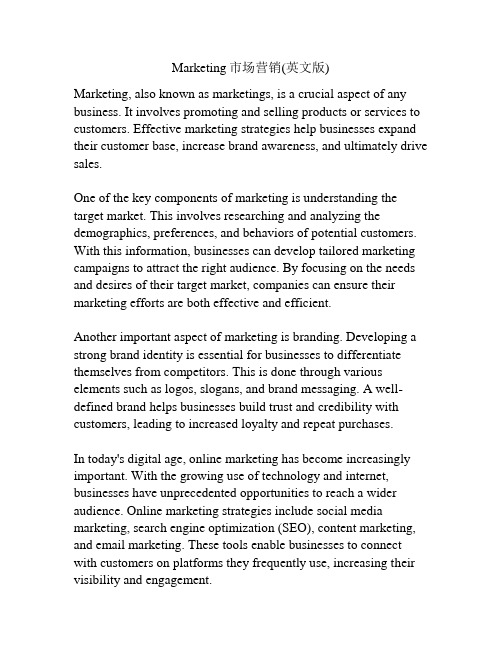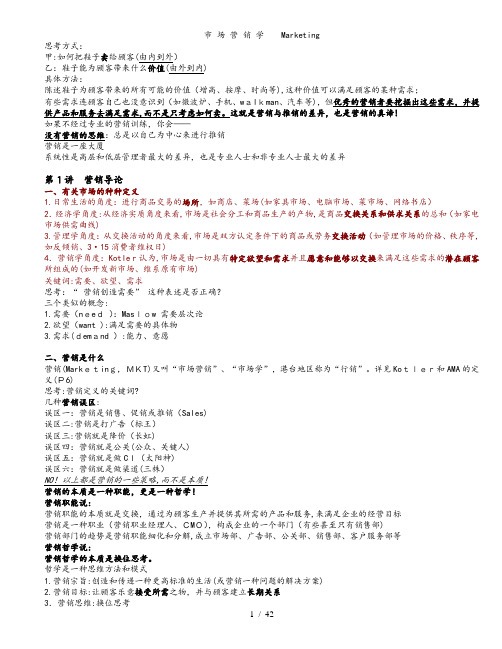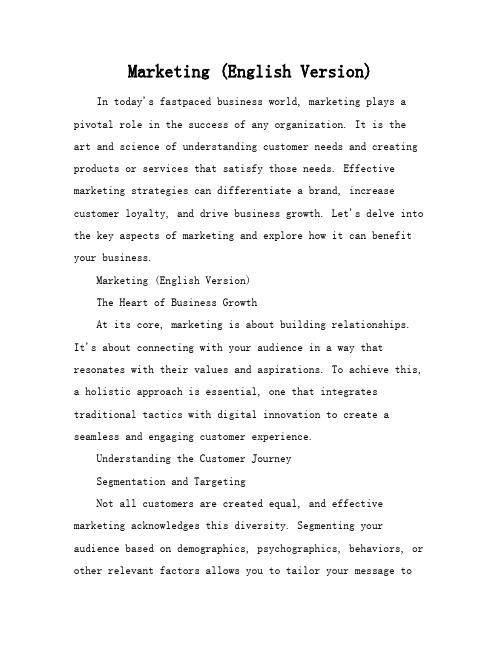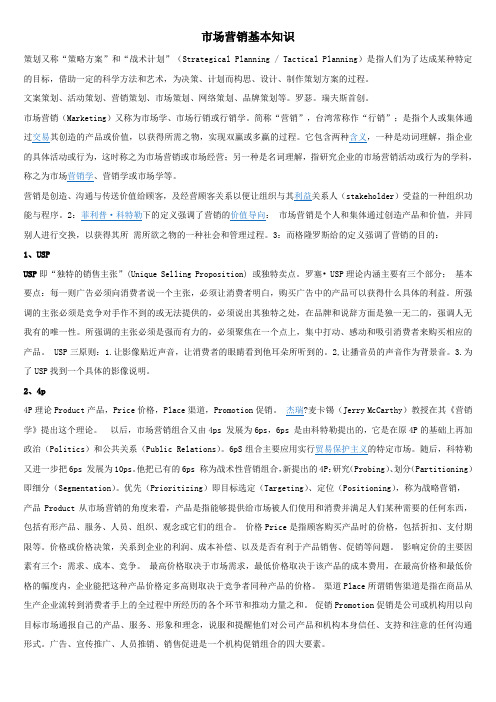市场营销 Marketing
Marketing市场营销(英文版)

Marketing市场营销(英文版)Marketing, also known as marketings, is a crucial aspect of any business. It involves promoting and selling products or services to customers. Effective marketing strategies help businesses expand their customer base, increase brand awareness, and ultimately drive sales.One of the key components of marketing is understanding the target market. This involves researching and analyzing the demographics, preferences, and behaviors of potential customers. With this information, businesses can develop tailored marketing campaigns to attract the right audience. By focusing on the needs and desires of their target market, companies can ensure their marketing efforts are both effective and efficient.Another important aspect of marketing is branding. Developing a strong brand identity is essential for businesses to differentiate themselves from competitors. This is done through various elements such as logos, slogans, and brand messaging. A well-defined brand helps businesses build trust and credibility with customers, leading to increased loyalty and repeat purchases.In today's digital age, online marketing has become increasingly important. With the growing use of technology and internet, businesses have unprecedented opportunities to reach a wider audience. Online marketing strategies include social media marketing, search engine optimization (SEO), content marketing, and email marketing. These tools enable businesses to connect with customers on platforms they frequently use, increasing their visibility and engagement.Another effective marketing technique is influencer marketing.This involves collaborating with influential individuals, such as celebrities or social media personalities, to promote products or services. By leveraging the popularity and credibility of these influencers, businesses can reach a larger audience and gain credibility and trust from their followers.Marketing also involves analyzing and measuring the effectiveness of marketing campaigns. This is done through metrics such as return on investment (ROI), customer acquisition cost (CAC), and customer lifetime value (CLTV). By tracking these metrics, businesses can evaluate the success of their marketing efforts and make any necessary adjustments to optimize their strategies.In conclusion, marketing plays a vital role in business success. It helps businesses understand their target market, build strong brands, and reach a wider audience through various channels. By implementing effective marketing strategies, businesses can increase their customer base, boost brand awareness, and ultimately drive sales.在一个竞争激烈的商业环境中,有效的营销策略是企业取得成功的关键。
市 场 营 销 学 Marketing

甲:如何把鞋子卖给顾客(由内到外)乙:鞋子能为顾客带来什么价值(由外到内)具体方法:陈述鞋子为顾客带来的所有可能的价值(增高、按摩、时尚等),这种价值可以满足顾客的某种需求;有些需求连顾客自己也没意识到(如微波炉、手机、walkman、汽车等),但优秀的营销者要挖掘出这些需求,并提供产品和服务去满足需求,而不是只考虑如何卖。
这就是营销与推销的差异,也是营销的真谛!如果不经过专业的营销训练,你会——没有营销的思维:总是以自己为中心来进行推销营销是一座大厦系统性是高层和低层管理者最大的差异,也是专业人士和非专业人士最大的差异第1讲营销导论一、有关市场的种种定义1.日常生活的角度:进行商品交易的场所,如商店、菜场(如家具市场、电脑市场、菜市场、网络书店)2.经济学角度:从经济实质角度来看,市场是社会分工和商品生产的产物,是商品交换关系和供求关系的总和(如家电市场供需曲线)3.管理学角度:从交换活动的角度来看,市场是双方认定条件下的商品或劳务交换活动(如管理市场的价格、秩序等,如反倾销、3·15消费者维权日)4.营销学角度:Kotler认为,市场是由一切具有特定欲望和需求并且愿意和能够以交换来满足这些需求的潜在顾客所组成的(如开发新市场、维系原有市场)关键词:需要、欲望、需求思考:“ 营销创造需要” 这种表述是否正确?三个类似的概念:1.需要(need):Maslow 需要层次论2.欲望(want ):满足需要的具体物3.需求(demand ):能力、意愿二、营销是什么营销(Marketing, MKT)又叫“市场营销”、“市场学”,港台地区称为“行销”。
详见Kotler和AMA的定义(P6)思考:营销定义的关键词?几种营销误区:误区一:营销是销售、促销或推销(Sales)误区二:营销是打广告(标王)误区三:营销就是降价(长虹)误区四:营销就是公关(公众、关键人)误区五:营销就是做CI(太阳神)误区六:营销就是做渠道(三株)NO!以上都是营销的一些策略,而不是本质!营销的本质是一种职能,更是一种哲学!营销职能说:营销职能的本质就是交换,通过为顾客生产并提供其所需的产品和服务,来满足企业的经营目标营销是一种职业(营销职业经理人、CMO),构成企业的一个部门(有些甚至只有销售部)营销部门的趋势是营销职能细化和分解,成立市场部、广告部、公关部、销售部、客户服务部等营销哲学说:营销哲学的本质是换位思考。
市场营销(英文版)

Marketing (English Version) In today's fastpaced business world, marketing plays a pivotal role in the success of any organization. It is theart and science of understanding customer needs and creating products or services that satisfy those needs. Effective marketing strategies can differentiate a brand, increase customer loyalty, and drive business growth. Let's delve into the key aspects of marketing and explore how it can benefit your business.Marketing (English Version)The Heart of Business GrowthAt its core, marketing is about building relationships.It's about connecting with your audience in a way that resonates with their values and aspirations. To achieve this, a holistic approach is essential, one that integrates traditional tactics with digital innovation to create a seamless and engaging customer experience.Understanding the Customer JourneySegmentation and TargetingNot all customers are created equal, and effective marketing acknowledges this diversity. Segmenting your audience based on demographics, psychographics, behaviors, or other relevant factors allows you to tailor your message todifferent groups. This targeted approach ensures that your marketing efforts are more relevant and, consequently, more effective.The Power of StorytellingStories are a universal language that can evoke emotions and create lasting memories. In marketing, storytelling is a powerful tool that can humanize your brand and make it more relatable. By crafting narratives that align with yourbrand's values and mission, you can forge a deeper connection with your audience and inspire them to take action.Leveraging Digital ChannelsMeasuring SuccessMarketing is an investment, and like any investment, it needs to be measured for return. Key performance indicators (KPIs) such as conversion rates, customer acquisition costs, and customer lifetime value provide a clear picture of your marketing efforts' effectiveness. By analyzing these metrics, you can refine your strategies, optimize your budget, and ensure that your marketing activities contribute to your business's bottom line.Continuous ImprovementMarketing (English Version)The Art of Persuasion and EngagementThe essence of marketing lies in its ability to persuade and engage. It's not just about selling products; it's about selling an experience, a lifestyle, and a vision. Here's how businesses can harness the full potential of marketing to achieve their goals.Crafting a Compelling Brand IdentityInfluencing Consumer BehaviorUnderstanding the psychology behind consumer behavior is crucial for marketers. By identifying the triggers that lead to purchasing decisions, you can design campaigns that nudge potential customers towards conversion. This involves not only the rational aspects of product features and benefits but also the emotional appeal that can often be the deciding factor in a consumer's choice.The Role of Content MarketingContent marketing is the strategic creation and distribution of valuable, relevant, and consistent content to attract and retain a clearly defined audience. It's about educating your customers, entertaining them, and providing solutions to their problems. From blog posts to videos, infographics to podcasts, highquality content can establish your brand as an authority in your industry and build trust with your audience.Collaborating with InfluencersCustomer Engagement and Retention Ethical Marketing Practices。
市场营销重点名词解释

第一章营销:创造和获取顾客价值1.市场营销marketing:定义为企业为从顾客处获得利益回报而为顾客创造价值并与之建立稳固关系的过程。
2.需要needs:人类的需要是一种感到缺乏的状态,包括对食品、服装、温暖和安全的基本生理需要,对归属和情感的社会需要,以及对知识和自我表达的个人需要。
这些需要并不是由市场营销者创造出来的,它们是人之所以为人的固有部分。
欲望wants:欲望是人类需要的表现形式,受到文化和个性的影响。
欲望由一个人的社会背景所决定,是明确表达的满足需要的指向物。
需求demands:在得到购买能力的支持时,欲望就转化为需求。
在既定的欲望和资源条件下,人们会选择能够产生最大价值和满意的产品。
3.市场营销近视症marketing myopia:销售人员常犯的错误是关注自己提供的特定产品甚于关注这些产品产生的利益和体验。
他们过于关注自己为现有欲望开发出来的产品,而忽略顾客需要的变化。
4.市场提供物market offering:即提供给市场以满足需要、欲望和需求的产品、服务或体验的集合。
5.交换exchange:是一种为从他人那里得到想要的物品而提供某些东西作为对价的行为。
6.市场market:是某种产品的实际购买者和潜在购买者的集合。
7.营销管理marketing manage:定义为选择目标市场并与之建立有价值的关系的艺术和科学。
8.生产观念production concept:认为消费者会青睐买得到的、价格低廉的产品。
所以,管理应该集中于提高生产和分销效率。
产品观念product concept:认为消费者会偏好那些具有最高质量、性能水平和富有创新特点的产品。
在奉行这种观念的企业中,市场营销战略往往集中于持续的产品改善。
推销观念selling concept:认为如果不采用大规模的促销努力,消费者不会购买足够多的产品。
它关注的是达成销售交易,而非建立长期的、有价值的客户关系。
市场营销观念marketing concept:认为实现组织目标的关键在于比竞争对手更好地了解目标顾客的需要和欲望,并使顾客感到满意。
市场营销基本概述 - 副本

市场营销基本概述一、市场营销(Marketing),又称作市场学、市场行销或行销学,MBA、EMBA等经典商管课程均将市场营销作为对管理者进行管理和教育的重要模块包含在内。
市场营销是在创造、沟通、传播和交换产品中,为顾客、客户、合作伙伴以及整个社会带来经济价值的活动、过程和体系。
主要是指营销人员针对市场开展经营活动、销售行为的过程。
二、研究对象早期市场营销的研究主要局限于商品的流通领域,而商品一旦到达消费者手中即进入到消费领域以后的问题,则不属于市场营销学的研究对象,显然,这是一种早期的、过时的市场营销概念。
而新时代的市场营销不仅仅是商品流通这一领域,还包括:前期的市场调研和商品售后等多方面。
三、研究内容营销原理:包括市场分析、营销观念、市场营销信息系统与营销环境、消费者需要与购买行为、市场细分与目标市场选择等理论。
营销实务:由产品策略、定价策略、分销渠道策略、促销策略、市场营销组合策略等组成。
营销管理:包括营销战略、计划、组织和控制等。
特殊市场营销:由网络营销、服务市场营销和国际市场营销等组成。
四、营销特点市场营销的第一目的是创造顾客,获取和维持顾客;要从长远的观点来考虑如何有效地战胜竞争对头,立于不败之地;注重市场调研,收集并分析大量的信息,只有这样才能在环境和市场的变化有很大不确定性的情况下做出正确的决策;积极推行革新,其程度与效果成正比;在变化中进行决策,要求其决策者要有很强的能力,要有像企业家一样的洞察力、识别力和决断力。
五、营销步骤1、分析市场机会2、选择目标市场3、确定市场营销策略4、市场营销活动管理(1)市场营销计划。
既要制定较长期战略规划,决定企业的发展方向和目标,又要有具体的市场营销计划,具体实施战略计划目标。
(2)市场营销组织。
营销计划需要有一个强有力的营销组织来执行。
根据计划目标,需要组建一个高效的营销组织结构,需要对组织人员实施筛选、培训、激励和评估等一系列管理活动。
(3)市场营销控制。
市场营销学:47个市场营销基本概念

市场营销学:47个市场营销基本概念1、市场营销/ 行销(Marketing):指用调查分析、预测、产品发展、订价、推广交易成实体配销技术来发掘、推广及满足社会各阶层人士对商品或劳务需求的一系列活动。
2、营销管理(Marketing Management):是为了实现企业目标,创造、建立和保持与目标市场之间的互利交换和关系,而对设计方案的分析、计划、执行和控制。
3、竞争者:竞争者一般是指那些与本公司提供的产品或服务类似,并且有相似目标顾客和相似价格的企业。
4、STP营销:是企业营销战略的核心,即实行市场细分化(Segmenting)、目标化(Targeting)和定位(Positioning)。
5、市场(Market):在营销者看来,卖主构成行业,买主则构成市场。
市场包含三个基本要素,即有某种需要的人,为满足这种需要的购买能力和购买欲望,用公司来表示就是:市场=人口+购买力+欲望。
6、市场细分(Segmenting):就是指企业通过市场调查、根据顾客对产品不同的需要和欲望、不同的购买行为与购买习惯,指导某一产品的整体市场分割成需要不同的若干子市场的分类过程。
7、目标市场(Targeting Market):目标市场是指企业经过比较、选择、决定作为服务对象的相应子市场。
8、市场定位(Positioning):根据所选定的目标市场上的竞争对手现有产品所处的位置和企业自身的条件,从各方面为企业和产品创造一定的特色,塑造并树立一定的市场形象,以求在目标顾客心目中形成一种特殊的偏爱。
9、市场营销组合(Marketing Mix):企业为了满足目标顾客群的需要而加以组合的可控制的度量。
10、产品(Product):是指能提供给市场,用于满足人们某种欲望和需要的任何事物,包括卖场、服务、场所、组织、思想、竞争者等。
11、服务(Service):用于出售或者是同产品连在一起进行出售的活动、利益或满足感。
12、整体产品=核心产品+有形产品+附加产品13、核心产品(Core Product):是指消费者购买某种产品时所追求的利益,是顾客真正需要的东西。
市场营销基本知识

市场营销基本知识策划又称“策略方案”和“战术计划”(Strategical Planning / Tactical Planning)是指人们为了达成某种特定的目标,借助一定的科学方法和艺术,为决策、计划而构思、设计、制作策划方案的过程。
文案策划、活动策划、营销策划、市场策划、网络策划、品牌策划等。
罗瑟。
瑞夫斯首创。
市场营销(Marketing)又称为市场学、市场行销或行销学。
简称“营销”,台湾常称作“行销”;是指个人或集体通过交易其创造的产品或价值,以获得所需之物,实现双赢或多赢的过程。
它包含两种含义,一种是动词理解,指企业的具体活动或行为,这时称之为市场营销或市场经营;另一种是名词理解,指研究企业的市场营销活动或行为的学科,称之为市场营销学、营销学或市场学等。
营销是创造、沟通与传送价值给顾客,及经营顾客关系以便让组织与其利益关系人(stakeholder)受益的一种组织功能与程序。
2:菲利普·科特勒下的定义强调了营销的价值导向:市场营销是个人和集体通过创造产品和价值,并同别人进行交换,以获得其所需所欲之物的一种社会和管理过程。
3:而格隆罗斯给的定义强调了营销的目的:1、USPUSP即“独特的销售主张”(Unique Selling Proposition) 或独特卖点。
罗塞• USP理论内涵主要有三个部分;基本要点:每一则广告必须向消费者说一个主张,必须让消费者明白,购买广告中的产品可以获得什么具体的利益。
所强调的主张必须是竞争对手作不到的或无法提供的,必须说出其独特之处,在品牌和说辞方面是独一无二的,强调人无我有的唯一性。
所强调的主张必须是强而有力的,必须聚焦在一个点上,集中打动、感动和吸引消费者来购买相应的产品。
USP三原则:1.让影像贴近声音,让消费者的眼睛看到他耳朵所听到的。
2,让播音员的声音作为背景音。
3.为了USP找到一个具体的影像说明。
2、4p4P理论Product产品,Price价格,Place渠道,Promotion促销。
市场营销专业英文介绍

市场营销专业英文介绍如下:Marketing is a major that explores the theories, concepts, and practices related to the promotion and sale of goods and services. It combines elements of psychology, sociology, and business to understand consumer behavior and market trends.The main focus of the marketing major is to provide students with a deep understanding of marketing concepts, strategies, and techniques. This includes an examination of buyer behavior, market research, product development, pricing, promotion, distribution, and sales.Students in this major also learn about marketing ethics and sustainability, as well as how to use digital tools and technologies to enhance marketing efforts. Additionally, they gain hands-on experience through internships, case studies, and other practical projects.The knowledge and skills gained through a marketing major can be applied in various industries, such as consumer goods, healthcare, technology, and non-profit organizations. Students who pursue this major often go on to become marketing managers, brand managers, product managers, or consultants in the private or public sector.总体来说,市场营销专业是一个综合性的学科,旨在培养学生在市场营销领域的理论知识和实践技能。
- 1、下载文档前请自行甄别文档内容的完整性,平台不提供额外的编辑、内容补充、找答案等附加服务。
- 2、"仅部分预览"的文档,不可在线预览部分如存在完整性等问题,可反馈申请退款(可完整预览的文档不适用该条件!)。
- 3、如文档侵犯您的权益,请联系客服反馈,我们会尽快为您处理(人工客服工作时间:9:00-18:30)。
3. Marketing expense-to-sales analysis
• How much did my marketing activities cost? • What sales numbers have these activities generated? Example: expenses (costs): € 200.000 sales revenues: € 200.001 => We have a problem!!!
Roles of marketing
main roles: • advertising (advertising and promotion managers) • selling (sales representatives/sales force) but also: • product development
back
2. Advertising
Presents a reason to buy a product/service Media:
back
3. Sales promotion
is a short-term incentive (Anreiz) to buy a product/service Techniques:
Techniques: press conferences contests community events charitable events ecological projects foundations
back
a) Annual-plan control
Tools:
1. Sales analysis
Positioning USA: “big and powerful”
after few years: Is this positioning still OK?
information policy - enough advertisement? - enough promotion?
back
1. Sales analysis
how many doors in what time? how many products sold?
back
d) Strategic control
Is my marketing program effective over a long period of time? marketing philosophy
Marketing
Preview
1. What is marketing? 2. How are markets analysed?
3. What product can I sell where at what price?
4. Have my marketing measures been effective?
Байду номын сангаас
back
1. Sales force
Representatives who advertise for and sell products they personalize the promotion process
effective at selling complex goods most expensive promotion
Comparison sales goals (100 units) actual sales (20 units) _____________ discrepancies???
reasons
better product of the competitors decline of the economic situation wrong calculation
2. Marketing-mix planning (4 P)
3. Marketing control
Annual-plan control Profitability control Efficiency control Strategic control
a) Product
back
c) Place
Production site
(distribution)
Warehouse
Wholesaler
-
factory outlet mail order house internet TV shopping door-to-door selling
consumer
Retailer
(brand and product managers)
• packaging
(packaging designers)
• pricing
(pricing specialists)
• distribution
(sales personnel)
Marketing Process
three elements:
Aim: Which of my products is the most profitable?
back
c) Efficiency control
Are my marketing methods profitable?
Example: Avon Lady (sales representative)
a) Segmentation
niche segment
individuals
b) Targeting:
Who are my customers?
c) Positioning:
What is my main selling point?
2. Marketing mix planning (4 P)
back
2. Market share analysis
analysis of the competition on the market
Rates of selling beauty cases
17% 28% Gucci 13% Joop Dolce & Gabbana Kuniberg
42%
back
1. Market analysis
(Who will buy?)
2. Marketing-mix planning
(What? Where? How much? How?)
3. Marketing control
(Have we been successful?)
1. Market analysis (STP)
1 price reduction
2. loyalty reward points 3. two for one
attracts brand switchers
back
4. Public relations
Does not aim to increase sales directly but tries to boost the image of the company
= developing a tactics to achieve strategic aims aim: to make customers from the target group buy elements: a) Product b) Price
c) Place
d) Promotion
3. Evaluation and control
Product development
traditional economies: same things produced and consumed nowadays:
- products have a life cycle
- product range is constantly expanded - find out what target market desires Consequence is adjustment of: - production - research & development - personnel administration - finance - public relations
(Did we sell as much as we planned?) (Have we lost or gained market share?) (Did the marketing efforts pay?)
2. Market-share analysis
3. Marketing expense-to-sales analysis
back
b) Profitability control
Do we have more earnings than expenditures?
Strategies:
• few expensive products and few customers
• many cheap products and many customers
Packaging
Branding
• • • • • create clear message create credibility involve emotionally motivate invite user loyalty
back
b) Price
Pricing strategies:
1. Market determines the price 2. Price as an expression of quality 3. Price as a method of gaining market share
Tools:
